 | |
| Former names | Wellesley Female Seminary (1870–1873) |
|---|---|
| Motto | Non Ministrari sed Ministrare (Latin) |
| Motto in English | Not to be ministered unto, but to minister |
| Type | Private women's liberal arts college |
| Established | 1870 (chartered) 1875 (commenced classes) |
| Accreditation | NECHE |
| Academic affiliations | |
| Endowment | $2.8 billion (2023) |
| President | Paula A. Johnson |
| Academic staff | 346 (2019) |
| Undergraduates | 2,280 (2020) |
| Location | Wellesley, Massachusetts, United States 42°17′43″N 71°18′24″W / 42.2953°N 71.3067°W / 42.2953; -71.3067 |
| Campus | Suburban (college town), 500 acres (200 ha) |
| Colors | Wellesley Blue |
| Nickname | Blue |
| Sporting affiliations | |
| Mascot | The Blue |
| Website | wellesley |
 | |
Wellesley College is a private women's liberal arts college in Wellesley, Massachusetts. Founded in 1870 by Henry and Pauline Durant as a female seminary, it is a member of the Seven Sisters Colleges, an unofficial grouping of current and former women's colleges in the northeastern United States.
Wellesley contains 60 departmental and interdepartmental majors spanning the liberal arts, as well as over 150 student clubs and organizations. Wellesley athletes compete in the NCAA Division III New England Women's and Men's Athletic Conference. Its 500-acre (200 ha) campus was designed by Frederick Law Olmsted and houses the Davis Museum and a botanic garden.
History
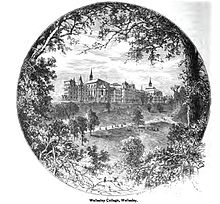
Wellesley was founded by Pauline and Henry Fowle Durant, believers in educational opportunity for women, who intended that the college should prepare women for "...great conflicts, for vast reforms in social life". Its charter was signed on March 17, 1870, by Massachusetts Governor William Claflin. The original name of the college was the Wellesley Female Seminary; its renaming to Wellesley College was approved by the Massachusetts legislature on March 7, 1873. Wellesley first opened its doors to students on September 8, 1875. At the time of its founding, Wellesley College's campus was actually situated in Needham; however, in 1880 residents of West Needham voted to secede and in 1881 the area was chartered as a new town, Wellesley.
Wellesley College was a leading center for women's study in the sciences. Between 1875 and 1921, Wellesley employed more female scientists than any other U.S. institution of high education. After MIT, it was the second college in the United States to initiate laboratory science instruction for undergraduates. In early 1896, Sarah Frances Whiting, the first professor of physics and astronomy, was among the first U.S. scientists to conduct experiments in X-rays.
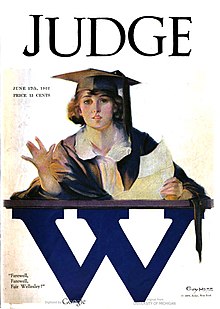
The first president of Wellesley was Ada Howard. There have been thirteen more presidents in its history: Alice Freeman Palmer, Helen Almira Shafer, Julia Irvine, Caroline Hazard, Ellen Fitz Pendleton, Mildred H. McAfee, Margaret Clapp, Ruth M. Adams, Barbara W. Newell, Nannerl O. Keohane (later the president of Duke University from 1993 to 2004), Diana Chapman Walsh, H. Kim Bottomly, and current president Paula Johnson.
The original architecture of the college consisted of one very large building, College Hall, which was approximately 150 metres (490 ft) in length and five stories in height. It was completed in 1875. The architect was Hammatt Billings. College Hall was both an academic building and a residential building. On March 17, 1914, it was destroyed by fire, the precise cause of which was never officially established. The fire was first noticed by students who lived on the fourth floor near the zoology laboratory. It has been suggested that an electrical or chemical accident in this laboratory—specifically, an electrical incubator used in the breeding of beetles—triggered the fire.
A group of residence halls known as the Tower Court complex is located on top of the hill where the old College Hall once stood.
After the loss of the Central College Hall in 1914, the college adopted a master plan in 1921 and expanded into several new buildings. The campus hosted a Naval Reserve Officer Training program during the Second World War, and the College President Mildred McAfee took a leave of absence to lead the Women's Reserve of the U.S. Navy. She received the Distinguished Service Medal in 1945. Wellesley College began to significantly revise its curriculum after the war and through the late 1960s; in 1968, the college began its exchange programs between other colleges in the area such as MIT. In 2013 the faculty adopted an open-access policy to make its scholarship publicly accessible online.
The school has admitted transgender, non-binary, and genderqueer students since adopting an inclusive admissions policy in 2015.
Campus

The 500-acre (200 ha) campus overlooks Lake Waban and includes evergreen, deciduous woodlands and open meadows. Frederick Law Olmsted Jr., Boston's preeminent landscape architect at the beginning of the 20th century, described Wellesley's landscape as "not merely beautiful, but with a marked individual character not represented so far as I know on the ground of any other college in the country". He also wrote: "I must admit that the exceedingly intricate and complex topography and the peculiarly scattered arrangement of most of the buildings somewhat baffled me". The campus is adjacent to the privately owned Hunnewell Estates Historic District, the gardens of which can be viewed from the lake's edge on campus.
The original master plan for Wellesley's campus landscape was developed by Olmsted, Arthur Shurcliff, and Ralph Adams Cram in 1921. This landscape-based concept represented a break from the architecturally-defined courtyard and quadrangle campus arrangement that was typical of American campuses at the time. The 720-acre (2.9 km) site's glaciated topography, a series of meadows, and native plant communities shaped the original layout of the campus, resulting in a campus architecture that is integrated into its landscape.
The campus offers multiple housing options, including Tower Court, which was built after College Hall burnt down, the Quad (Quint, including Munger), the "New Dorms", referring to the east-side dormitories erected in the 1950s, and multiple "Branch Halls", including both a Spanish and French-speaking house. In total, Wellesley offers 17 different residence halls for students to live in.
The most recent master plan for Wellesley College was completed in 1998 by Michael Van Valkenburgh Associates. According to the designers, this plan was intended to restore and recapture the original landscape character of the campus that had been partially lost as the campus evolved through the 20th century. In 2011, Wellesley was listed by Travel+Leisure magazine as one of the most beautiful college campuses in the United States.
Wellesley is home to Green Hall, completed in 1931, the only building bearing the name of famed miser Hetty Green; the building was funded by her children. Part of the building is the Galen L. Stone Tower, housing a 32-bell carillon, which is routinely played between classes by members of the Guild of Carillonneurs.
Houghton Chapel was dedicated in 1899 in the center of the college campus. The architectural firm of Heins & LaFarge designed Houghton of gray stone in the classic Latin cross floor plan. The exterior walls are pierced by stained glass windows. Window designers include Tiffany; John La Farge; Reynolds, Francis & Rohnstock; and Jeffrey Gibson. The chapel can seat up to 750 people. Houghton is used by the college for a variety of religious and secular functions, like lectures and music concerts, and is also available for rental. The lower-level houses the Multifaith Center.
In 1905 Andrew Carnegie donated $125,000 to build what is now known as Clapp Library, on the condition that the college match the amount for an endowment. The money was raised by 1907 and construction began June 5, 1909. In 1915 Carnegie gave another $95,446 towards an addition. This renovation added a recreational reading room, offices, archives, a reserve reading room, added space for rare books and additional stacks. The building underwent renovations from 1956 to 1959, that doubled its size. From 1973 to 1975 a major addition was added to the right-hand side of the building. In 1974 the building was renamed for Margaret Antoinette Clapp, a Pulitzer Prize-winning author and member of the 1930 class who served as the eighth college president from 1949 to 1966.
The Davis Museum, opened in 1993, was the first building in North America designed by Pritzker Prize-winning architect Rafael Moneo, whose notion of the museum as a "treasury" or "treasure chamber" informs its design. The Davis is at the heart of the arts on the Wellesley campus adjacent to the academic quad and is connected by an enclosed bridge to the Jewett Arts Center, designed by Paul Rudolph. The collections span from ancient art from around the world to contemporary art exhibitions, and admission is free to the general public.
 Wellesley College campus, fall 2006
Wellesley College campus, fall 2006
Administration

The current president of Wellesley College is Paula Johnson. Johnson previously founded the Connors Center for Women's Health and Gender Biology at Brigham and Women's Hospital. She was the Grace A. Young Family Professor of Medicine in the Field of Women's Health at Harvard Medical School, as well as professor of epidemiology at the Harvard T.H. Chan School of Public Health. Johnson succeeded H. Kim Bottomly to become Wellesley's 14th President in July 2016.
Wellesley's fund-raising campaign in 2005 set a record for liberal arts colleges with a total of $472.3 million, 18.1% more than the goal of $400 million. According to data compiled by The Chronicle of Higher Education, Wellesley's campaign total is the largest of any liberal arts college. In late 2015, the college launched another campaign, with a goal of $500 million. Many notable alumnae including Madeleine Albright, Hillary Clinton, Diane Sawyer, Susan Wagner, and Cokie Roberts collaborated on the campaign video and launch festivities. As of Fall 2017, over $446 million has been raised.
Wellesley Centers for Women
The Wellesley Centers for Women (WCW) is one of the largest gender-focused social science research-and-action organizations in the United States. Located on and nearby the Wellesley College campus, WCW was established when the Center for Research on Women (founded 1974) and the Stone Center for Development Services and Studies at Wellesley College (founded 1981) merged into a single organization in 1995. It is home to several prominent American feminist scholars, including Jean Kilbourne and Peggy McIntosh. The current executive director of the Wellesley Centers for Women is Layli Maparyan. Since 1974, the Wellesley Centers for Women has produced over 200 scholarly articles and over 100 books.
The Wellesley Centers for Women has five key areas of research: education, economic security, mental health, youth and adolescent development, and gender-based violence. WCW is also home to long-standing and highly successful action programs that engage in curriculum development and training, professional development, evaluation, field building, and theory building. Those programs include the National SEED Project, the National Institute on Out-of-School Time, Open Circle, the Jean Baker Miller Training Institute, and Women's Review of Books.
Academics

Wellesley's average class size is between 17 and 20 students, with a student-faculty ratio of 7:1. 60 departmental and interdepartmental majors are offered.
Wellesley offers support to nontraditional aged students through the Elisabeth Kaiser Davis Degree Program, open to students over the age of 24. The program allows women who, for various reasons, were unable to start or complete a bachelor's degree at a younger age to attend Wellesley.
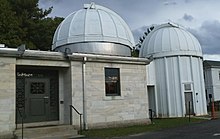
Wellesley offers dual degree programs with the Massachusetts Institute of Technology and the Olin College of Engineering, enabling students to receive a Bachelor of Science at those schools in addition to a Bachelor of Arts at Wellesley. Wellesley also has a joint five-year BA/MA program with Brandeis University's International Business School, which allows qualified Wellesley students to receive a Masters of Arts degree from the school as well as a Bachelor of Arts at Wellesley.
Wellesley College offers research collaborations and cross-registration programs with other Boston-area institutions, including Massachusetts Institute of Technology, Babson College, Olin College, and Brandeis University.
Its most popular majors, based on 2023 graduates, were:
- Economics (94)
- Computer Sciences (67)
- Psychology (53)
- Political Science (45)
- Biological Sciences (37)
- Neuroscience (35)
- Mathematics (27)
- English (27)
Admissions
| 2021 | 2019 | 2018 | 2017 | 2016 | 2015 | |
|---|---|---|---|---|---|---|
| Applicants | 7,920 | 6,395 | 6,631 | 5,666 | 4,854 | 4,555 |
| Admits | 1,240 | 1,379 | 1,296 | 1,251 | 1,388 | 1,380 |
| % Admitted | 16 | 21.6 | 19.5 | 22.1 | 28.6 | 30.3 |
| Enrolled | 606 | 612 | 614 | 605 | 590 | 595 |
| Mid 50% SAT range | 1479 | 1370-1510 | 1330-1520 | 1360-1530 | 1970-2250 | 1940-2240 |
| Mid 50% ACT range | 33 | 31-34 | 30-34 | 30-33 | 30-33 | 29-33 |
The 2020 annual ranking of U.S. News & World Report categorizes admission to Wellesley as "most selective". For the Class of 2023 (enrolling fall 2019), the middle 50% range of SAT scores was 680–750 for evidence-based reading and 680–780 for math, while the middle 50% range for the ACT composite score was 31–34 for enrolled first-year students. For the incoming class of 2028, Wellesley received a record number of applications, totaling over 8,900 applications, and 13% of applicants were offered admission. During the 2023-2024 admissions cycle (enrolling Fall 2024), the college was test-optional and did not publish standardized testing statistics for the class of 2027 as of July 2024. The college is need-blind for domestic applicants.
Transgender applicants
The college's admissions policy was updated in 2015 to allow trans women and non-binary people assigned female at birth to be considered for admittance. The first Wellesley transgender students enrolled in Fall 2017.
Nontraditional age applicants
Wellesley began its program for non-traditional students in 1971 when the Continuing Education Program was launched. This program was renamed in 1991 for Elisabeth Kaiser Davis, a member of the Class of 1932. Wellesley allows applicants older than 24 who had begun but have not completed a bachelor's degree to apply to the Elizabeth Kaiser Davis Degree Program. Davis Scholars are fully integrated into the Wellesley community; they take the same classes as traditional students and can choose to live on campus. According to the Wellesley web site, Davis Scholars' "diverse backgrounds, experiences and perspectives enrich the lives of the whole student body."
Tuition and financial aid
For the 2024–2025 school year, Wellesley's annual tuition was $92,060 per year, the first tuition cost for a Boston-area school (along with Boston University) to exceed $90,000 annually. In 2020–2021, the average annual aid offer was over $56,000. The maximum loan level for other students on aid is $12,825 total for four years.
Rankings
| Academic rankings | |
|---|---|
| Liberal arts | |
| U.S. News & World Report | 4 |
| Washington Monthly | 15 |
| National | |
| Forbes | 44 |
| WSJ/College Pulse | 31 |
In its 2021 rankings of national liberal arts colleges in the U.S., U.S. News & World Report ranked Wellesley tied for fourth best overall, first for women's colleges, 13th for "best value", tied at 11th for "best undergraduate teaching", and tied at 63rd for "top performers on social mobility".
In 2020, Washington Monthly ranked Wellesley 13th among 218 liberal arts colleges in the U.S. based on its contribution to the public good, as measured by social mobility, research, and promoting public service.
In addition, Forbes' 2019 "America's Top Colleges" ranked the institution 44th among 650 U.S. colleges, service academies and universities. Wellesley College is accredited by the New England Commission of Higher Education.
Student life
Approximately 98% of students live on campus. Some cooperative housing is available, including a sustainable living co-op, a feminist co-op, and a French language house located slightly off-campus. Wellesley offers housing for Davis Scholars as well, though not for their children or spouses, which is a point of frequent debate on campus.

For more than 50 years, Wellesley has offered a cross-registration program with MIT. Students can participate in research at MIT through the Undergraduate Research Opportunities Program (UROP). In recent years, cross-registration opportunities have expanded to include nearby Babson College, Brandeis University, and Olin College of Engineering. To facilitate cross-registration, the Wellesley College Senate bus connects Wellesley to the Harvard University and MIT campuses in Cambridge, Massachusetts; additionally, the college also operates a shuttle to the Babson College and Olin College campuses. It is also a member of a number of exchange programs with other small colleges, including opportunities for students to study a year at Amherst, Connecticut College, Dartmouth, Mount Holyoke, Smith, Trinity, Vassar, Wesleyan, and Wheaton.
Organizations
The college has approximately 180 student organizations, ranging from cultural and political organizations to community service, publications, campus radio, and club sports.
WZLY is the college's campus radio station. It is entirely student-run and plays on 91.5 FM in the town of Wellesley and some surrounding areas. Founded in 1942, it holds claim to be the oldest still-running women's college radio station in the country.
Publications on campus include Counterpoint, the monthly journal of campus life; The Wellesley News, the campus newspaper; International Relations Council Journal, the internationally oriented campus publication; The Wellesley Review, the literary magazine; and W.Collective, the fashion and lifestyle magazine.
There are also several social organizations on campus, called "societies," which each have a unique academic focus. In order to join, students must attend "teas" where they can learn more about the focus of each society. Societies that are active on campus include the Shakespeare Society (theater), Society Zeta Alpha (literature), Tau Zeta Epsilon (arts and music), and Agora Society (politics).
Athletics
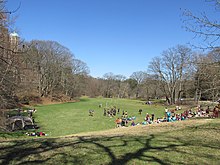
Wellesley fields 13 varsity sports teams – basketball, crew, cross country, fencing, field hockey, golf, lacrosse, soccer, softball, swimming & diving, tennis, track & field, and volleyball. Wellesley does not have a mascot in the traditional sense – its sports teams are referred to both individually and collectively as "the Blue" (the school colors are royal blue and white). Wellesley is a member of the NCAA NCAA Division III and the Eastern Conference Athletic Conference (ECAC) and competes primarily as a member of the New England Women's and Men's Athletic Conference (NEWMAC).
The Wellesley College Crew Team, affectionately known as "Blue Crew", was founded in 1970 and was the first women's intercollegiate rowing team in the country. In 2016, Blue Crew won the NCAA Division III Rowing Championship as a team for the first time in Wellesley history, with its first Varsity 8+ boat placing first and second Varsity 8+ boat placing second. This historic win marked the first time a team from Wellesley College won a national championship and the first time a women's college won the NCAA Rowing Championships. In 2022, Blue Crew won the NCAA Division III Rowing Championship as a team for a second time, with both its first Varsity 8+ and second Varsity 8+ boats placing second. In 2023, Blue Crew again won the NCAA Division III Rowing Championship as a team, with its first Varsity 8+ boat placing first and second Varsity 8+ boat placing second.
Wellesley also fields club teams in archery, alpine & Nordic skiing, equestrian, ice hockey, rugby, sailing, squash, Ultimate Frisbee, and water polo. Squash was originally a varsity sport but was downgraded to a club sport status in 2017.
From 1943 to 1946, Judy Atterbury won multiple national intercollegiate women's tennis championships in both singles (1943, 1946) and doubles (1943, 1944). Nadine Netter won the Eastern Women's College Tournament in 1962, and was the Eastern Intercollegiate Champion and New England Intercollegiate women's Tennis Championship winner in 1965.
Crew
In both 2016 and 2023, Wellesley College's first Varsity 8+ boat became a national champion in its event at the NCAA Rowing Championships. Wellesley College Crew Team's head coach, Tessa Spillane, was voted the NCAA Division III Rowing Coach of the Year in 2010–11, 2015–16, and 2021–22. Additionally, Wellesley College Crew Team's coaching staff received the 2015–16 and 2021–22 CRCA NCAA Division III National Coaching Staff of the Year awards.
Traditions

Hoop rolling is an annual tradition at the college that dates to 1895. Each upperclasswoman has a wooden hoop, often passed down to her from her "big sister". Before graduation, the seniors, wearing their graduation robes, run a short race while rolling their hoops. In the early 20th century, the winner was said to be the first in her class to marry; in the 1980s, the winner was said to become the class's first CEO; and since the 1990 Commencement speech by then-First Lady Barbara Bush, the winner has been said to be the first to achieve success, however she defines it.
The Wellesley campus sits just before the halfway mark on the Boston Marathon course, and students come out to cheer runners in what has become known as the "Scream Tunnel". Student have been cheering on runners since the first running of the marathon. In 1966 the school heard word that a woman was running in the race and turned out in numbers in cheer her on. Once women were officially allowed to register for the 1972 race, the campus cheer tradition became more popular.
Notable alumnae and faculty
Main article: List of Wellesley College people See also: List of Presidents of Wellesley CollegeNotable alumnae
-
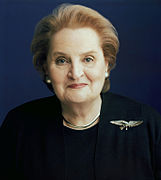 Madeleine Albright
Madeleine Albright
-
 Katharine Lee Bates
Katharine Lee Bates
-
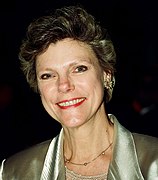 Cokie Roberts
Cokie Roberts
-
 Diane Sawyer
Diane Sawyer
-
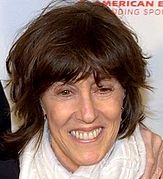 Nora Ephron
Nora Ephron
-
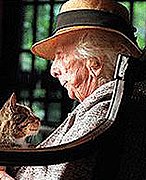 Marjory Stoneman Douglas
Marjory Stoneman Douglas
-
 Soong Mei-ling
Soong Mei-ling
-
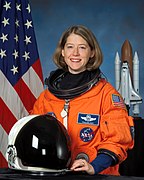 Pamela Melroy
Pamela Melroy
-
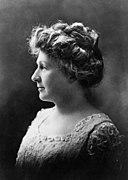 Annie Jump Cannon
Annie Jump Cannon
Wellesley's alumnae are represented among business executives and also work in a variety of other fields, ranging from government and public service to the arts. They include the first woman to be named professor of clinical medicine Connie Guion, class of 1906; architect Ann Beha, class of 1972; author Harriet Stratemeyer Adams (author and publisher) class of 1914; astronomer Annie Jump Cannon, class of 1884; archaeologist Josephine Platner Shear, class of 1924; astronaut Pamela Melroy class of 1983; screenwriter Nora Ephron, class of 1962; composers Elizabeth Bell and Natalie Sleeth; and professor and songwriter Katharine Lee Bates. Journalists Callie Crossley, Diane Sawyer, Cokie Roberts, Lynn Sherr, and Michele Caruso-Cabrera also graduated from Wellesley as did Amalya Lyle Kearse, Judge on the United States Court of Appeals for the Second Circuit, Sandra Lynch, United States Circuit Judge of the United States Court of Appeals for the First Circuit, and political scientist Jane Mansbridge, class of 1961. Rebecca Lancefield, a member of the National Academy of Sciences, graduated from Wellesley, as did Alice Ames Winter (B.A. 1886; M.A. 1889), president of the General Federation of Women's Clubs. Adaline Emerson Thompson, class of 1880, later served as a trustee for twenty years.
Both Madeleine Albright ('59), and Hillary Rodham Clinton ('69), have spoken about the formative impact their Wellesley experiences had on their careers. During her life, Secretary Albright returned annually to campus to lead the Madeleine Korbel Albright Institute for Global Affairs, a month-long pedagogical seminar where students learn more about global affairs through analysis and action. Additionally, three U.S. ambassadors (Julieta Valls Noyes, Anne Patterson, and Michele Sison) are Wellesley alumnae. Soong Mei-ling, the wife of former President Chiang Kai-shek of the Republic of China, graduated from Wellesley.
Other notable Wellesley graduates who have received the college's Alumnae Achievement Award include: Anna Medora Baetjer, class of 1920, public health expert, physiologist, toxicologist; Marian Burros '54, journalist, food writer; Sally Carrighar, class of 1922, writer, naturalist; Elyse Cherry '75, an entrepreneur, financial, and social equity activist; Suzanne Ciani '68, electronic music composer, recording artist; Phyllis Curtin '43, opera singer; Jocelyn Gill '38, astronomer; Marjory Stoneman Douglas, class of 1912, environmental activist, author; Persis Drell '77, particle physicist; Nora Ephron '62, writer and director; Helen Hays '53, ornithologist; Dorothea Jameson '42, psychologist; Jean Kilbourne '64, media educator; Judith Martin '59, (pen name Miss Manners) author; Nergis Mavalvala '90, a quantum astrophysicist; Lorraine O'Grady '55, conceptual artist and cultural critic; Santha Rama Rau '45, writer; Marilyn Yalom '54, historian, feminist scholar; and Patricia Zipprodt '46, costume designer.
Additional notable alumni include Jasmine Guillory '97, American New York Times Best-selling author, and Vicky Tsai '00, Tatcha Founder.
Notable faculty
Notable Wellesley faculty include:
- Myrtilla Avery, art historian and a Monuments Men
- Emily Green Balch, economist and peace activist
- Katharine Lee Bates, poet, novelist, essayist
- Frank Bidart, poet
- Karl E. Case, economist
- Dan Chiasson, poet and writer
- Margaret Clapp, author
- Katharine Coman, economic historian
- Rose Laub Coser, sociologist
- Alona E. Evans, political scientist
- Jorge Guillén, poet and literary critic
- Charlotte Houtermans, physicist
- Grace E. Howard, botanist
- Jonathan B. Knudsen, historian
- Frances Lowater, physicist and astronomer
- Paul K. MacDonald, political scientist
- Mary Kate McGowan, philosopher of language
- Peggy McIntosh, women's studies scholar
- Vladimir Nabokov, novelist
- Adrian Piper, philosopher
- Marietta Sherman Raymond, violinist, music educator, orchestral conductor
- Susan Mokotoff Reverby, Gender Studies professor
- Alan Schechter, political scientist
- Vida Dutton Scudder, English professor
- Helen L. Webster, philologist and educator
- Sarah Frances Whiting, physicist and astronomer
See also
- Wellesley College Botanic Gardens
- Wellesley College Tupelos
- Women's colleges in the United States
- List of coordinate colleges
- Boston marriage § Wellesley marriage
- Mona Lisa Smile a fictional film about Wellesley in the 1950s
References
- "Wellesley Facts". Wellesley.edu. Retrieved May 14, 2020.
- "NAICU – Member Directory". Naicu.edu. Archived from the original on November 9, 2015. Retrieved November 21, 2015.
- As of June 30, 2023. "U.S. and Canadian 2023 NCSE Participating Institutions Listed by Fiscal Year 2023 Endowment Market Value, Change in Market Value from FY22 to FY23, and FY23 Endowment Market Values Per Full-time Equivalent Student" (XLSX). National Association of College and University Business Officers (NACUBO) and TIAA. February 15, 2024. Archived from the original on May 23, 2024. Retrieved July 25, 2024.
- ^ "Wellesley College Common Data Set 2019-20" (PDF). Wellesley College. Retrieved May 14, 2020.
- "Wellesley Facts | Wellesley College". Wellesley.edu. Retrieved March 18, 2022.
- "Wellesley College Visual Identity Guidelines" (PDF). Wellesley College. September 15, 2017. Archived (PDF) from the original on July 8, 2018. Retrieved July 7, 2018.
- Arlene Cohen, Wellesley College (Arcadia Publishing, 2006).
- "A Brief History of Wellesley College". Wellesley College. 2007. Archived from the original on June 22, 2012. Retrieved November 24, 2012.
- Rossiter, Margaret (1982). Women Scientists in America: Struggles and Strategies to 1940. Johns Hopkins University Press. pp. 25–26.
- Cameron, John S.; Musacchio, Jacqueline Marie (August 1, 2020). "Sarah Frances Whiting and the "photography of the invisible"". Physics Today. 73 (8): 26–32. Bibcode:2020PhT....73h..26C. doi:10.1063/PT.3.4545. ISSN 0031-9228.
- Palmieri, Patricia Ann (1995). In Adamless Eden: the community of women faculty at Wellesley. New Haven, Conn.: Yale Univ. Pr. p. 235. ISBN 978-0-300-06388-2.
- ^ "College History". Wellesley College. Retrieved July 21, 2022.
- "Wellesley College". ROARMAP: Registry of Open Access Repository Mandates and Policies. UK: University of Southampton. December 15, 2014. Archived from the original on July 14, 2017. Retrieved July 24, 2018.
- "Reaffirmation of Mission and Announcing Gender Policy". Wellesley College.
- "Historical Maps". Wellesley.edu. Archived from the original on July 27, 2010. Retrieved February 21, 2010.
- Campbell, Robert (November 13, 2005). "Center of Attention on a Centerless Campus". Boston Globe. Archived from the original on August 8, 2007. Retrieved February 21, 2010.
- "America's most beautiful college campuses". Travel+Leisure. September 2011. Archived from the original on January 21, 2014. Retrieved January 28, 2014.
- "Hetty Green (1834–1916)". Virtual Vermont. Virtual Vermont Internet Services. Archived from the original on July 14, 2014. Retrieved July 8, 2014.
- Hardwick, M. Jeffrey (December 1, 2001). "Review: The Landscape and Architecture of Wellesley College by Peter Fergusson, James F. O' Gorman, John Rhodes; Building America's First University: An Historical and Architectural Guide to The University of Pennsylvania by George E. Thomas, David B. Brownlee". Journal of the Society of Architectural Historians. 60 (4): 523–525. doi:10.2307/991747. ISSN 0037-9808. JSTOR 991747. Archived from the original on September 30, 2017. Retrieved September 30, 2017.
- ^ "Houghton Chapel and Multifaith Center". Wellesley College. Trustees of Wellesley College. Archived from the original on July 22, 2017. Retrieved July 19, 2017.
- "Houghton chapel stained glass windows". Wellesley College. Trustees of Wellesley College. 2013. Archived from the original on October 16, 2017. Retrieved July 19, 2017.
- "William S. Houghton Memorial Chapel". Historic Campus Architecture Project. Council of Independent Colleges. November 2006. Archived from the original on April 5, 2018. Retrieved July 19, 2017.
- Allen, Evan (April 29, 2012). "Wellesley College's new stained glass features a goddess of many truths". The Boston Globe. Boston Globe Media Partners, LLC. Archived from the original on April 5, 2018. Retrieved July 19, 2017.
- "New Chapel Windows Celebrate Power of Light". The Wellesley Effect. Wellesley College. December 16, 2016. Archived from the original on August 14, 2017. Retrieved July 19, 2017.
- "Ceremonies at Wellesley / The Houghton Chapel". Wellesley College. Trustees of Wellesley College. Archived from the original on October 12, 2017. Retrieved July 19, 2017.
- "Rewriting the Book on Clapp Library | Wellesley Magazine". magazine.wellesley.edu. Archived from the original on April 24, 2018. Retrieved April 23, 2018.
- "Clapp Library". Wellesley College. Archived from the original on April 24, 2018. Retrieved April 23, 2018.
- "Wellesley College Names Harvard's Paula A. Johnson Its 14th President". Wellesley College. Archived from the original on August 1, 2016. Retrieved July 23, 2016.
- "Wellesley College Completes Record-Setting Campaign; Women's College Raises $472 Million, Highest Among Liberal Arts Colleges". web.wellesley.edu. Archived from the original on September 21, 2016. Retrieved July 23, 2016.
- "The Wellesley Effect". campaign.wellesley.edu. Archived from the original on July 15, 2017. Retrieved July 23, 2016.
- "The Campaign for Wellesley". The Campaign for Wellesley. Archived from the original on September 29, 2017. Retrieved September 28, 2016.
- "Home | Re:Gender". Ncrw.org. October 20, 2015. Archived from the original on December 12, 1998. Retrieved November 21, 2015.
- "Wellesley Centers for Women About us | About us Extra Information | About us". Wcwonline.org. Archived from the original on October 26, 2015. Retrieved October 27, 2015.
- "Wellesley Centers for Women Fast Facts | About us Extra Information | About us". Wcwonline.org. Archived from the original on November 22, 2015. Retrieved October 27, 2015.
- "Research | Wellesley Centers for Women". Archived from the original on July 9, 2017. Retrieved February 26, 2018.
- "Academics - Academics". Wellesley. Retrieved July 8, 2024.
- "Wellesley College, Nontraditional Student Website: Davis Degree Program". Wellesley.edu. May 24, 2006. Archived from the original on April 15, 2012. Retrieved February 21, 2010.
- "Dual Degree with MIT". Wellesley.edu. Archived from the original on December 6, 2014. Retrieved November 21, 2015.
- "Dual Degree with Olin". Wellesley.edu. Archived from the original on November 22, 2015. Retrieved November 21, 2015.
- "BA/MA (Brandeis/Wellesley Undergraduates Only)". www.brandeis.edu. Archived from the original on September 7, 2015. Retrieved September 23, 2023.
- "Graduates and Degree Conferral". Wellesley. Retrieved July 8, 2024.
- "FAQ". Wellesley College. Retrieved January 8, 2022.
- "Wellesley College Common Data Set 2018-19" (PDF). Wellesley College. Retrieved May 14, 2020.
- "Wellesley College Common Data Set 2017–2018" (PDF). Wellesley College. Archived (PDF) from the original on September 18, 2018. Retrieved September 6, 2019.
- "Wellesley College Common Data Set 2016–2017" (PDF). Wellesley College. Archived (PDF) from the original on May 19, 2017. Retrieved September 6, 2019.
- "Common Data Set 2015–2016" (PDF). Wellesley College. Archived (PDF) from the original on March 14, 2017. Retrieved September 6, 2019.
- ^ "Wellesley College Rankings". U.S. News & World Report. 2021. Retrieved October 13, 2020.
- "Welcome to Wellesley, class of 2028!". Wellesley. March 18, 2024. Retrieved July 8, 2024.
- "Cost & Financial Aid". Wellesley College. Retrieved May 4, 2023.
- "Wellesley to accept transgender women - The Boston Globe". BostonGlobe.com. Archived from the original on November 20, 2017. Retrieved March 6, 2018.
- "All-Female Massachusetts College Welcomes First Transgender Students". 1420 WBSM. September 5, 2017. Archived from the original on March 7, 2018. Retrieved March 6, 2018.
- "Campus Life: Wellesley; A Higher Profile for Older Students". The New York Times. March 17, 1991. ISSN 0362-4331. Retrieved February 1, 2022.
- "Davis Degree Program Applicants". Wellesley College. Retrieved November 16, 2020.
- Wellesley College. "Davis Degree Program and Postbaccalaureate Study Program." Archived 2006-09-02 at the Wayback Machine 24 May 2006.
- Welker, Grant; Tran, Jericho (March 26, 2024). "A first for Mass. colleges: Breaking the $90,000 barrier". NBC Boston. Retrieved July 26, 2024.
- "Student Financial Services". Wellesley College. Retrieved July 21, 2022.
- "Understanding Financial Aid". Wellesley.edu. July 30, 2007. Archived from the original on January 27, 2010. Retrieved February 21, 2010.
- "2024-2025 National Liberal Arts Colleges Rankings". U.S. News & World Report. September 23, 2024. Retrieved November 22, 2024.
- "2024 Liberal Arts Colleges Rankings". Washington Monthly. August 25, 2024. Retrieved August 29, 2024.
- "America's Top Colleges 2024". Forbes. September 6, 2024. Retrieved September 10, 2024.
- "2025 Best Colleges in the U.S." The Wall Street Journal/College Pulse. September 4, 2024. Retrieved September 6, 2024.
- "2020 Liberal Arts College Rankings". Washington Monthly. Retrieved September 2, 2020.
- "America's Top Colleges". Forbes. August 15, 2019. Retrieved September 2, 2020.
- Massachusetts Institutions – NECHE, New England Commission of Higher Education, retrieved May 26, 2021
- Farrell, Elizabeth F. (May 26, 2006). "A Pregnant Cause – Student Affairs – The Chronicle of Higher Education". Chronicle.com. Archived from the original on June 14, 2009. Retrieved February 21, 2010.
- "UROP for Wellesley College Students | MIT Undergraduate Research Opportunities Program". urop.mit.edu. Retrieved November 16, 2020.
- "Opportunities at Other Schools". Wellesley College. Archived from the original on June 26, 2015. Retrieved June 25, 2015.
- "Investigating Some Contenders for the Oldest Women's College Radio Station - Radio Survivor". January 5, 2016. Archived from the original on December 18, 2018. Retrieved December 17, 2018.
- "Wellesley Student Radio Station Turns 70 | Wellesley College". Archived from the original on December 18, 2018. Retrieved December 17, 2018.
- Directory of Electronic Journals, Newsletters, and Academic Discussion Lists. 1996. p. 119.
- Merchant, Sanika. "The Tea on Wellesley Societies". The Wellesley News. Retrieved December 2, 2024.
- "Wellesley Crew Wins the 2022 NCAA DIII Rowing National Championship". May 28, 2022.
{{cite journal}}: Cite journal requires|journal=(help) - "Wellesley wins 2023 NCAA DIII rowing national championship". National Collegiate Athletic Association. Pennsauken, New Jersey. May 27, 2023. Archived from the original on July 18, 2023. Retrieved August 6, 2023.
- "Wellesley College Squash To Compete As A Club Sport Beginning In 2017-18". Wellesley. March 22, 2017. Retrieved November 16, 2020.
- "Pre-NCAA women's collegiate tennis". Tennis Forum. Retrieved May 25, 2021 – via Newspapers.com. (Boston Globe, 1929-1953. St. Louis Post-Dispatch, 1954-1963.)
- "Blue Crew's Spillane, Muller, Ball Named CRCA Division III National Coach and Staff of the Year". July 8, 2022.
{{cite journal}}: Cite journal requires|journal=(help) - Wellesley College Office for Public Affairs (April 25, 2009). "Susan Wang Wins Wellesley's 114th Annual Hoop Rolling Contest" (Press release). Wellesley College. Archived from the original on May 16, 2010.
- "All About Hooprolling". Wellesley.edu. Archived from the original on January 8, 2010. Retrieved February 21, 2010.
- "Wellesley Scream Tunnel: Cheers, Kisses, and Funny Signs". Runner's World. April 17, 2017. Archived from the original on April 30, 2018. Retrieved April 29, 2018.
- "Marathon Monday". Wellesley College. Archived from the original on April 30, 2018. Retrieved April 29, 2018.
- "First Lady of Boston". Runner's World. April 6, 2016. Archived from the original on April 30, 2018. Retrieved April 29, 2018.
- "A history of the Wellesley College Boston Marathon 'Scream Tunnel'". Boston.com. April 12, 2018. Archived from the original on April 30, 2018. Retrieved April 29, 2018.
- Dobrzynski, Judith H. (October 29, 1995). "How to Succeed? Go to Wellesley". The New York Times. ISSN 0362-4331. Archived from the original on February 27, 2017. Retrieved April 25, 2016.
- WeNews Staff (January 2, 2007). "21 Leaders 2007: Seven Who Exert the Power of their Voice". www.womensenews.org. Archived from the original on November 30, 2018. Retrieved November 29, 2018.
- O'Hern, Elizabeth M. (1975). "Rebecca Craighill Lancefield: Pioneer Microbiologist" (PDF). ASM (American Society for Microbiology) News. 41 (12). Archived (PDF) from the original on April 30, 2018. Retrieved November 29, 2018.
- James, Edward T.; James, Janet Wilson; Boyer, Paul S. (1971). Radcliffe College (ed.). Notable American Women, 1607-1950: A Biographical Dictionary. Harvard University Press. p. 40. ISBN 978-0-674-62734-5.
- Wellesley College (1915). Annual Reports [of] President and Treasurer (Public domain ed.). p. 7. Retrieved April 18, 2022.
 This article incorporates text from this source, which is in the public domain.
This article incorporates text from this source, which is in the public domain.
- "About | Albright Institute". www.wellesley.edu. Archived from the original on June 30, 2018. Retrieved June 3, 2018.
- Li, Laura Tyson (2007). Madame Chiang Kai-Shek: China's Eternal First Lady. Open Road + Grove/Atlantic. pp. 34–38, 212.
- Pakula, Hannah (2009). The Last Empress: Madame Chiang Kai-shek and the Birth of Modern China. NY: Simon and Schuster. ISBN 9781439148945.
- "Alumnae Achievement Awards: All Recipients by Award Year". Wellesley College. Archived from the original on July 2, 2019. Retrieved September 8, 2019.
- Carey, Emily (April 4, 2019). "Wellesley alum Jasmine Guillory '97 soars on the New York Times Best Sellers List | The Wellesley News". Retrieved June 20, 2024.
- "Where Are They Now: Victoria Tsai '00 – Wellesley Career Education Blog". blogs.wellesley.edu. Retrieved June 20, 2024.
- "The "Monuments Men" of Wellesley College". Wellesley College. Archived from the original on December 16, 2017. Retrieved December 16, 2017.
- "Coser, Rose Laub". Jewish Virtual Library. Archived from the original on April 24, 2018.
- "The Origins of "Privilege"". The New Yorker. May 12, 2014. Archived from the original on May 27, 2014. Retrieved August 17, 2014.
- "Vladimir Nabokov at Wellesley". Wellesley College. January 8, 2001. Archived from the original on December 6, 2014. Retrieved December 4, 2014.
Further reading
- Bonillas, Luisa Elena. "Pushing for change: Women of color at Wellesley College, 1966–2001" (PhD dissertation, Arizona State University; ProQuest Dissertations Publishing, 2007. 3287915).
- Calkins, Mary Whiton. “Experimental Psychology at Wellesley College.” American Journal of Psychology, vol. 5, no. 2, 1892, pp. 260–71. online
- Clemence, Richard V. “The Wellesley Undergraduate Tutorial.” American Economic Review' 51#3 (1961), pp. 385–88. online
- Cohen, Arlene. Wellesley College (Arcadia Publishing, 2006). description
- Fergusson, Peter, James F. O'Gorman, and John Rhodes. The Landscape and Architecture of Wellesley College (Stuttgart, Germany: Cantz Publishing for Wellesley College, 2001) online book review
- Horowitz, Helen Lefkowitz. Alma Mater: Design and experience in the women's colleges from their nineteenth-century beginnings to the 1930s (Univ of Massachusetts Press, 1993) .online
- Morgan, Anne Eugenia. “Bible-Study at Wellesley College.” The Old Testament Student, vol. 7, no. 10, 1888, pp. 308–11 online
- Olsen, Deborah M. “Remaking the Image: Promotional Literature of Mount Holyoke, Smith, and Wellesley Colleges in the Mid-to-Late 1940s.” History of Education Quarterly 40#4 (2000), pp. 418–59. online
- Palmieri, Patricia A. "Here was fellowship: A social portrait of academic women at Wellesley College, 1895–1920." History of Education Quarterly 23.2 (1983): 195-214. online
- Palmieri, Patricia Ann. "In Adamless Eden: A social portrait of the academic community at Wellesley College, 1875-1920" (PhD dissertation, Harvard University; ProQuest Dissertations Publishing, 1981. 8125492).
- Solomon, Barbara Miller. In the Company of Educated Women: A History of Women and Higher Education in America (Yale University Press, 1985) online
- Stevenson, Ana. "Women in the Ivory Tower: Historical Memory and the Heroic Educator in Mona Lisa Smile (2003)." in Academia and Higher Learning in Popular Culture (Cham: Springer International Publishing, 2023) pp. 111–130.
- “The Wellesley College Graduate Who Was the Nation’s First Black Woman Judge.” The Journal of Blacks in Higher Education no. 34, (2001), pp. 36–37. online
- “Wellesley College and its relations to lady-teachers.” National Journal of Education, vol. 10, no. 3, 1879, pp. 44–44. online
External links
![]() Media related to Wellesley College at Wikimedia Commons
Media related to Wellesley College at Wikimedia Commons
- Wellesley College
- 1875 establishments in Massachusetts
- Universities and colleges established in 1875
- Liberal arts colleges in Massachusetts
- Seven Sister Colleges
- Universities and colleges in Norfolk County, Massachusetts
- Wellesley, Massachusetts
- Women's universities and colleges in the United States
- Private universities and colleges in Massachusetts
- Need-blind educational institutions